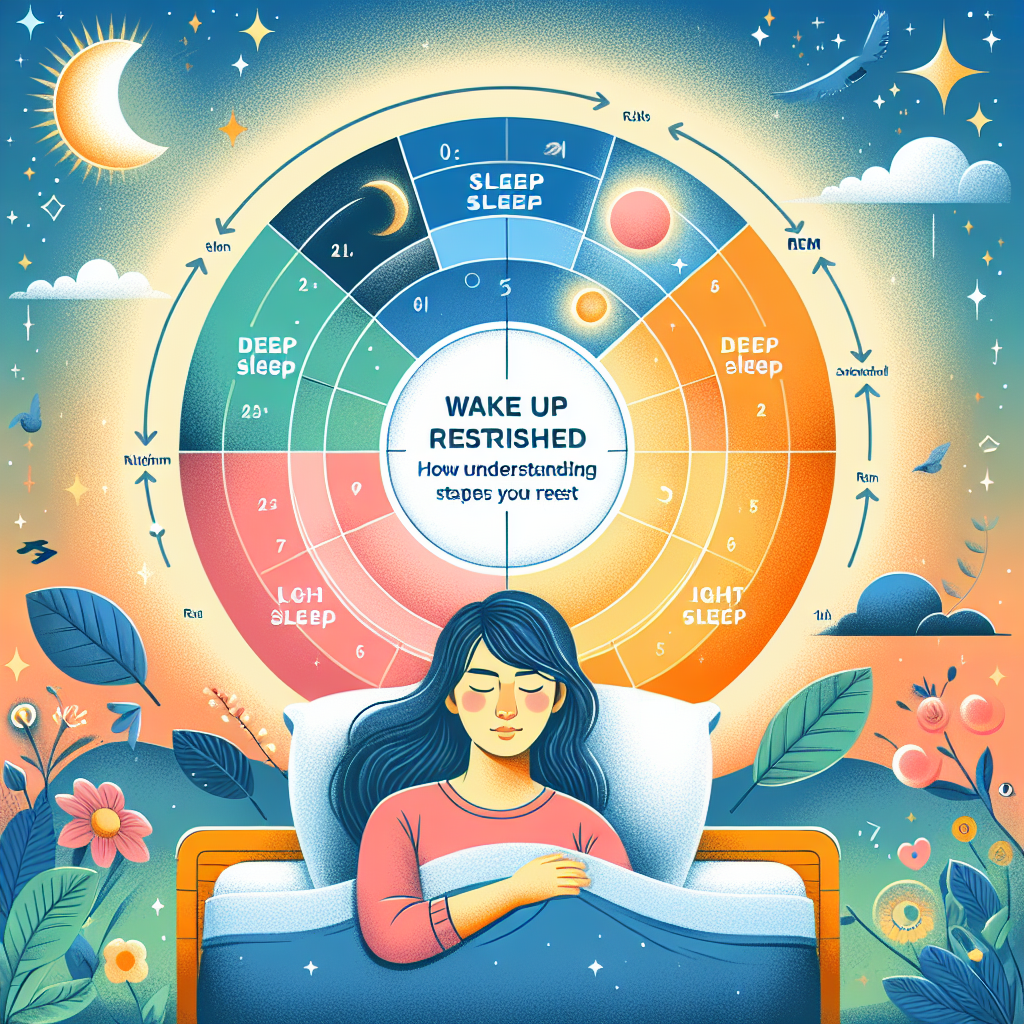
Wake Up Refreshed: How Understanding Sleep Stages Can Improve Your Rest
Introduction
In an age where productivity reigns supreme and the hustle culture often consumes us, the quality of our sleep has never been more crucial. Imagine waking up every morning feeling truly refreshed, invigorated, and ready to take on the world. You might think this level of restorative sleep is a distant dream, but what if I told you that understanding sleep stages could be the key to achieving it?
In this article, we will dive deep into the intricate world of sleep, exploring the various stages that your body cycles through each night. By the end, you’ll discover practical ways to optimize your sleep experience, helping you wake up refreshed: how understanding sleep stages can improve your rest.
The Science of Sleep
Before we can grasp how the different stages of sleep might influence our overall health and wellbeing, we need to understand what sleep really is. Sleep is a complex biological process that provides necessary restorative functions for our bodies and minds. It is divided into two primary categories: Rapid Eye Movement (REM) sleep and Non-Rapid Eye Movement (NREM) sleep.
The Stages of Sleep
NREM Sleep
NREM sleep consists of three distinct stages:
Stage 1 (Light Sleep): This is the transition phase between wakefulness and sleep. It’s when you fall asleep and lasts for a few minutes. During this stage, your body starts to relax, muscles begin to loosen, and brain waves start to slow down.
Stage 2 (Intermediate Sleep): Lasting about 20 minutes, this stage accounts for approximately 50% of your total sleep time. Your heart rate slows, body temperature drops, and your brain waves are characterized by sleep spindles and K-complexes, which are thought to be important for memory consolidation.
- Stage 3 (Deep Sleep): Often referred to as slow-wave sleep, this stage is crucial for physical recovery, growth, and immune function. It’s difficult to awaken someone in this stage, and it plays a vital role in feeling refreshed upon waking.
REM Sleep
Immediately after completing a full NREM cycle, your body enters REM sleep. This stage is where most dreaming occurs, and it’s essential for cognitive functions such as memory, learning, and emotional regulation. REM sleep involves increased brain activity and is believed to be critical for mental health.
Illustrated Sleep Cycle
To visualize the sleep process, consider the following chart:
| Sleep Stage | Duration (Minutes) | Primary Functions |
|---|---|---|
| Stage 1 | 5-10 | Transition to sleep; light sleep |
| Stage 2 | 20-25 | Body temperature drops; heart rate slows |
| Stage 3 | 20-40 | Deep sleep; physical recovery; immune system boost |
| REM | 10-20 | Dreaming; brain restoration; emotional health |
Why Understanding Sleep Stages Matters
Knowing the stages of sleep and their functions can empower you to enhance your sleep quality. The phrase wake up refreshed: how understanding sleep stages can improve your rest isn’t just catchy; it highlights the practical benefits of this knowledge.
Case Study: The College Student
Consider the case of Jessica, a college student who crammed for exams through sleepless nights. Despite spending an average of 8 hours in bed, she often felt tired upon waking. After learning about the stages of sleep, she adjusted her sleeping schedule to focus on achieving the recommended 7-9 hours of quality sleep, understanding when to go to bed to maximize REM and deep sleep. Within two weeks, Jessica reported feeling significantly more alert and focused, demonstrating how critical it is to understand sleep stages to truly wake up refreshed.
Tips for Improving Sleep Quality
Now that we have a comprehensive understanding of sleep stages, let’s discuss actionable strategies to enhance sleep quality.
1. Prioritize Sleep Hygiene
Good sleep hygiene can lead to a more restful night. Develop a routine that includes:
- Going to bed and waking at the same time every day.
- Creating a restful environment: dark, cool, and quiet.
- Minimizing screen time at least an hour before bed, as blue light can interfere with melatonin production.
2. Embrace Relaxation Techniques
Incorporating mindfulness practices such as meditation, breathing exercises, or progressive muscle relaxation can help your body transition into sleep more effectively.
3. Monitor Food and Drink Intake
Avoid heavy meals, caffeine, and alcohol close to bedtime. While alcohol may make you feel drowsy initially, it disrupts REM sleep, affecting your overall rest.
4. Maintain a Consistent Routine
Your body thrives on routine. Try to maintain a consistent schedule, both for your waking hours and your bedtimes to help regulate your internal clock.
5. Get Regular Exercise
Physical activity is crucial for sleep quality. Aim for at least 30 minutes of moderate exercise most days, but try to avoid vigorous workouts close to bedtime.
Understanding Your Sleep Needs
Everyone has unique sleep requirements. While the general guideline is to aim for 7-9 hours, individuals may need more or less. To determine how much sleep you need to wake up refreshed: how understanding sleep stages can improve your rest, consider keeping a sleep diary for a couple of weeks, recording your sleep duration and how refreshed you feel each morning.
The Impact of Technology on Sleep Stages
In modern society, technology plays a dual role when it comes to sleep. While there are numerous sleep-tracking apps and gadgets to help you understand your sleep patterns, excessive use of electronic devices before bedtime negatively impacts sleep stages.
Case Study: Tech and Sleep
Consider the example of Mark, who relied on a sleep tracker to monitor his sleep cycles. Initially, he thought the data would help him optimize rest, but he found that obsessively checking his sleep patterns only increased his anxiety about not getting enough sleep. Ultimately, Mark learned to disconnect from technology before bed, leading him to a more peaceful night’s sleep and waking up feeling better rested.
The Role of Nutrition in Sleep
Nutrition influences sleep stages significantly. Certain foods can promote or hinder sleep quality.
Table: Foods That Aid or Hinder Sleep
| Foods that Aid Sleep | Foods that Hinder Sleep |
|---|---|
| Almonds (melatonin source) | Caffeinated beverages |
| Turkey (tryptophan) | Spicy foods (can cause reflux) |
| Fatty fish (Omega-3s) | Sugary snacks |
| Herbal tea (chamomile, valerian) | Heavy or rich foods |
The Importance of Daylight Exposure
Your body’s circadian rhythm—the internal clock that regulates sleep-wake cycles—relies heavily on exposure to natural light. Aim for at least 30 minutes of sunlight exposure during the day, especially in the morning.
Case Study: Shift Workers
Consider healthcare workers who often have night shifts. Many experience difficulty waking up refreshed: how understanding sleep stages can improve your rest because their sleep patterns vary drastically. Research has shown that those who incorporate strategic exposure to light can better regulate their sleep patterns, aiding in their transition both to sleep and wakefulness.
Conclusion
Understanding how sleep stages work empowers you to enhance your rest profoundly. By embracing the knowledge that the transition from light to deep sleep and into REM sleep is essential for waking up refreshed, you can take proactive measures to improve the quality of your sleep.
To truly wake up refreshed: how understanding sleep stages can improve your rest, commit to optimizing your sleep hygiene, listening to your body’s needs, and embracing relaxation techniques. By doing so, you’re taking a significant step towards more than just better sleep—you’re aiming for better health, improved mood, and enhanced productivity in your daily life.
FAQs
How many sleep cycles should I go through each night?
- On average, adults complete 4-6 sleep cycles per night, each lasting about 90-120 minutes.
What happens if I don’t go through all sleep stages?
- Missing out on deep sleep and REM sleep can lead to fatigue, decreased cognitive function, and mood disturbances.
Can naps help me compensate for lost sleep?
- Yes, short naps (20-30 minutes) can be beneficial, but long naps or napping late in the day can disrupt nighttime sleep.
How does stress affect my sleep stages?
- Stress and anxiety can prevent you from entering deeper stages of sleep, leading to a poorer quality of rest.
- Are sleep disorders common?
- Sleep disorders such as insomnia and sleep apnea are prevalent and can significantly impact sleep quality. Consulting a healthcare professional is crucial for diagnosis and treatment.
By understanding sleep stages and implementing effective strategies, you can unlock the door to waking up genuinely refreshed—reclaiming your days that may have been clouded by fatigue. Embrace this knowledge and embark on the journey toward better rest today!

















